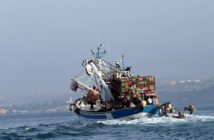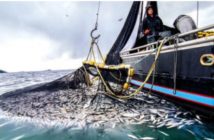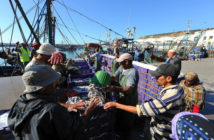Scoop – New Zeeland
Press Release: International Seafood Sustainability Foundation
MEDIA ADVISORY
Conservation Group Calls for Management Improvements ahead of Atlantic Tuna Meeting
ISSF releases position statement for ICCAT 18th Special Meeting
Washington, DC – 6 November 2012 -The International Seafood Sustainability Foundation (ISSF) has released its position statement in advance of the 18th Special Meeting of the International Commission for the Conservation of Atlantic Tunas (ICCAT) in Agadir, Morocco next week.
In the paper, ISSF urges ICCAT to further expand uponlast year’s general framework for harvest control rules by establishing stock-specific target and limit reference points and to specify the probability levels that will be associated with the recommendations from the 2011 framework.
Controlling capacity for tropical tuna fisheries by reducing the amount of vessels on the water so that the fleet size is commensurate with the stock assessments in the region is also a focal point of the ISSF position, along with an expansion of the region’s observer coverage. Starting next January, ICCAT will implement 100 percent observer coverage during the two-month FAD closure, but ISSF recommends that coverage extends over the entire year.
“Implementing comprehensive observer coverage begins to address issues of transparency that threaten the sustainability of tuna fisheries,” said ISSF President, Susan Jackson. “The Atlantic has improved observer coverage in its tuna fisheries recently but now nations need to make that next big push to 100 percent coverage in its tropical purse seine fisheries.”
ISSF also urged nations to adopt a stronger FAD management policy to assure that FAD data are collected and reported to the ICCAT Standing Committee on Research and Statistics (SCRS). ISSF President Susan Jackson added, “FAD fishing accounts for almost 40 percent of global tuna catches, and the first meaningful step to a broad global effort to improve FAD management in all ocean regions is to collect better data in these fisheries. If RFMO scientists have ample data they can determine appropriate management measures, which ultimately leads to sound policy.”
Other improvements addressed in the ISSF position statement include mandated assessments for skipjack stocks, prohibitions on both the at-sea removal of shark fins and on the intentional purse seine setting around whale sharks, as well as comprehensive catch and bycatch retention measures for all tunas and bycatch species.
To access the full position statement click here.
About the International Seafood Sustainability Foundation (ISSF)
The International Seafood Sustainability Foundation (ISSF) is a global coalition of scientists, the tuna industry and World Wildlife Fund (WWF), the world’s leading conservation organization, promoting science-based initiatives for the long-term conservation and sustainable use of tuna stocks, reducing bycatch and promoting ecosystem health. To learn more, visit their website at iss-foundation.org.
.






